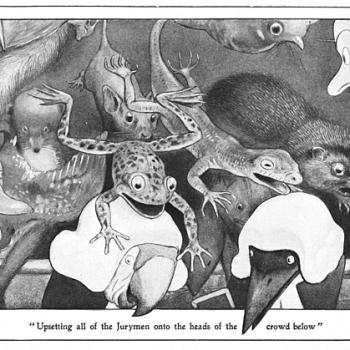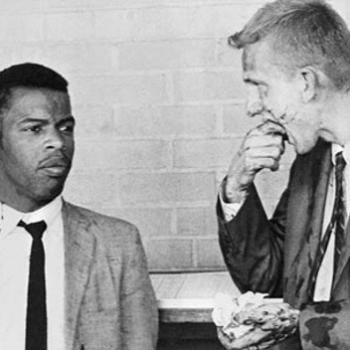Lectionary Reflections
1 Samuel 16:1-13
March 30, 2014
There is a certain oddness to the choice of this text for the fourth Sunday in Lent. It does, of course, contain a famous Bible line that many have heard but could probably not name the place of its origin: "YHWH does not see as mortals see; they look on the outward appearance, but YHWH looks on the heart" (1 Sam. 16:7). Perhaps the lectionary collectors have in their ears the lines from Isaiah 53 that will sound their mournful call during Holy Week: "he had no form or majesty that we should look at him, nothing in his appearance that we should desire him" (Is. 53:2). Isaiah, of course, was referring to his mysterious Suffering Servant whom he imagined was Israel or some portion of it, while the early Christians saw here the spitting image of the one they called Christ, abused and scorned on that painful hill.
Yet, I am not altogether convinced that those scriptural connections caused our lectionary friends to choose as they did. After all, what the narrative of 1 Samuel 16 is about is the anointing of the shepherd David to be the new king of Israel, directly after the prophet Samuel had humiliated and deposed YHWH's first choice for king, the mighty Saul, on the sacred mountain of Gilgal. In fact, the anointing of David, the youngest of the eight sons of an obscure Bethlehemite farmer named Jesse, is here described as a devious plot, hatched by YHWH and Samuel, in order to hide the deed from Saul, the legitimate king, earlier crowned—once privately and twice publicly—by this same Samuel at the direct instigation of this same YHWH. In short, the whole scene has a decided smell to it, more than a whiff of legerdemain and double-dealing. But it is a marvelous tale, well worth the telling. Perhaps in that telling we might unearth a reason for its inclusion as we journey through Lent.
"YHWH said to Samuel, 'How long will you complain about Saul. I have rejected him from being king over Israel'" (1 Sam. 1). The NRSV's reading, "grieve over Saul," is not what Samuel's mood appears to be at this time. He has grandly dishonored and shamed the king in front of his people in 1 Samuel 15. It is absurd to imagine that he is now "grieving" over the man. If anything, he is obsessed with him, fixated on his ruin, appalled that he ever crowned him in the first place. YHWH has had enough of Saul and more than enough of the prophet's concern about him. "Fill your horn with oil (that same object with which Saul was anointed in 1 Sam. 9) and get going. I am sending you to Jesse, the Bethlehemite, since I have provided a king for myself from among his sons" (1 Sam. 16:1).
But Samuel, suddenly fearful of the man he has just deliciously rejected—he showed not a hint of fear or hesitation in the act—claims that if Saul, king of Israel, finds out that Samuel and YHWH are about to choose still another king, he will kill him. And who could blame him? Can a land have two kings? YHWH has a plan to fool all concerned. God tells Samuel to go to Bethlehem with a sacrificial animal in tow, announcing quite plainly that Samuel has come for sacrifice only, an act he has performed throughout Israel for decades. And YHWH continues the charge to the prophet: "Invite Jesse to the sacrifice, and I will show you what you are to do" (1 Sam. 16:3). Samuel readily agrees to the plot.
He trudges toward Bethlehem, a village not far from the high rock of the Jebusites, later named Jerusalem, but a fair distance from Gilgal and Gibeah, places associated with the kingship of Saul. As the prophet walks into the village, the elders come "trembling" to meet him. The confrontation between Samuel and Saul at Gilgal has apparently spread to the farthest corners of the tiny land, and even the elders of puny Bethlehem are fearful that they too will be swept up in the struggles for power underway in their distant village. Samuel quickly assures them that he has come "peaceably," and issues an invitation to Jesse and his sons to join him in the sacrifice.
The farmer tells his sons to wash for the sacrificial event, and arranges his seven visible sons in order of their age. The eldest, Eliab ("my God is father"), quickly catches the old prophet's eye, and he mutters to himself, "Certainly YHWH's anointed is standing before me" (1 Sam. 16:6). But the YHWH who first spoke to Samuel at the small shrine of Shiloh so many years before (1 Sam. 3) now speaks again and utters those words quoted above; we humans look too easily at the outward appearance of a person, while YHWH looks somehow within. In effect, YHWH tells Samuel, "No more tall guys! We had one of those and he did not work out as we had hoped." So, Eliab is rejected, as are his six brothers. Samuel turns to Jesse and says, "YHWH has chosen none of these" (1 Sam. 16:10).
The prophet is perplexed and perhaps a little upset, since prophets, and especially this prophet, are not used to being wrong in their attempts to follow what they have been asked to do. So he turns again to Jesse, "Are all your sons here?" "Well," the old man replies, "there is the youngest, but he keeps sheep." The implication is that this unnamed boy is hardly welcome at the site of sacrifice, but is only worthy to work apart from his family in the far-flung fields of the flock. Samuel's eyes spark as he hears of another son, another candidate for the kingship, however strange such a choice might be. "Send and bring him, for we will not sit down until he comes" (1 Sam. 16:11).





